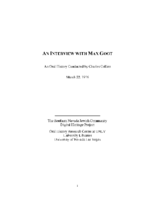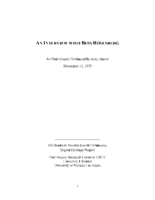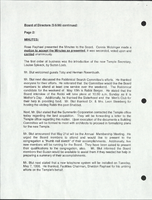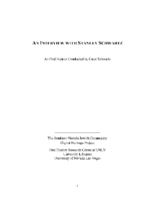Search the Special Collections and Archives Portal
Search Results

Transcript of interview with Max Goot by Charles Collins, March 22, 1976
Date
Archival Collection
Description
Interview with Max Goot by Charles Collins, March 22, 1976. In this interview, Goot talks about how he came to Las Vegas in 1945 and purchased Stoney's Jewelry, which he sold in 1951, and then bought Tinch Furniture Store. He was friends with Hank Greenspun and active in local politics and community affairs, including Temple Beth Sholom. He talks about selling the former Beth Sholom building at 13th and Carson Streets to the Greek church, and other fund raising activities. He speaks briefly about atomic tests, and the growth of the city.
Text

Transcript of interview with Bess Rosenberg by Jerry Masini, November 12, 1975
Date
Archival Collection
Description
Interview with Bess Rosenberg by Jerry Masini on November 12, 1975. In this interview, Rosenberg describes coming to Las Vegas in 1942, and the desert landscape. She gives an in-depth recollection of the first atomic test, and talks about different weather and the seasons in Las Vegas. Rosenberg describes several clubs and hotels around downtown and the recreation at Lake Mead and Mount Charleston.
Text

Minutes from Temple Beth Sholom Board of Directors meetings, 1995-1996
Date
Archival Collection
Description
Meeting minutes include reports from committees of the board, correspondence, and balance sheets.
Text

Transcript of interview with Stanley Schwartz by Carol Schwartz, March 1, 1980
Date
Archival Collection
Description
Interview with Stanley Schwartz by Carol Schwartz on March 1, 1980. Stanley talks about coming to Las Vegas in 1951 to open a clothing business on Main Street, Schwartz Brothers Clothing. He compares the business district of the 1950s to the district in 1980, and advertising opportunities in the newspapers and on the radio. Schwartz talks about suit styles and changing preferences of buyers, and moving the store to Second Street, then Fremont Street, then to Maryland Square Shopping Center. In 1970, he changed the focus of the clothing store to "big and tall" and talks about the importance of customer service in retaining customers. He mentions Al Benedict and Herb Tobman as people he admired.
Text
Transcript of bus tour of "Jewish Las Vegas" by Temple Beth Sholom, May 17, 2015
Date
Archival Collection
Description
Temple Beth Sholom organized and led a bus tour of parts of Las Vegas that are significant in local Jewish history. Stops on the tour included Woodlawn Cemetery and the former Temple Beth Sholom campus on Oakey Boulevard. Narrator Arlene Blut gives the overview of the Jewish community, and Rabbi Felipe Goodman talks to tour participants at the cemetery. Former Las Vegas mayor Oscar Goodman speaks at the old synagogue along with Josh Abbey, whose mother created the stained glass windows at the temple.
Text

Transcript of interview with Sonja Saltman by Barbara Tabach, August 18, 2015
Date
Archival Collection
Description
Included in this oral history are reminiscences of Sonja Saltman's personal non-Jewish heritage in Austria, the importance of her grandmother in her life, and how she recalls becoming part of the Jewish community.
Sonja Saltman is a psychologist and philanthropist in Las Vegas, Nevada. She is executive director and co-founder of the Existential Humanistic Institute, a non-profit organization based in San Francisco, California that offers training in existential-humanistic therapy and theory. In 2003 Sonja and her husband Michael Saltman founded the Saltman Center for Conflict Resolution at the University of Nevada, Las Vegas (UNLV) William S. Boyd School of Law. The Saltman Center is focused on research, teaching, and public service related to "the advanced study of the nature of conflict and how to resolve it." A native of Austria, Sonja Saltman also serves as the Honorary Consul for Austria in Las Vegas. The Saltmans are involved with multiple charitable organizations and initiatives, both locally and abroad. Sonja Saltman has served on the boards of the Anti-Defamation League, Nevada Women's Philanthropy, and the Black Mountain Institute. Projects that the couple has supported include the rebuilding of homes and bridges is Bosnia, and Streetball Hafla, a basketball program to improve relations between Jewish and Arab teenagers in Israel. In 2014 Sonja and Michael Saltman were recognized as Distinguished Nevadans by the Nevada System of Higher Education. Included in this oral history are reminiscences of her personal non-Jewish heritage in Austrian, the importance of her grandmother in her life, and how she recalls becoming part of the Jewish community.
Text

Transcript of interview with Marla Letizia by Barbara Tabach, August 26, 2015
Date
Archival Collection
Description
In this interview, Letizia discusses her career, and breaking gender barriers in both broadcasting as well as in advertising. She also talks about how her family ended up settling in Las Vegas, and the evolution of her relationship with Judaism from childhood to adulthood, eventually leading to her leadership roles with Congregation Ner Tamid as well as Jewish Federation, where she is on the Board of Directors.
Marla R. Letizia is the founder of Big Traffic Mobile Billboards in Las Vegas, Nevada. The company operates mobile billboard advertising trucks and employs brand ambassadors to carry WOBI? walking billboards for retail, gaming, and entertainment clients such as Caesars entertainment, Tropicana, and Cirque Du Soleil. Letizia founded Big Traffic in 2001 after leaving a successful broadcast journalism career to raise her two children. She met her husband, Tom Letizia, while working at KLAS-TV Channel 8 as an assistant production manager. She later became the first female director of live television news broadcasts in Las Vegas at Channel 8. She also developed a TV show called "Las Vegas Turnaround" and a syndicated production called "The Parenting Network." Letizia grew up in Las Vegas, and is a former president of Congregation Ner Tamid and a founding member of the board of trustees of the Meadows School in Las Vegas. In this interview, Letizia discusses her career, and breaking gender barriers in both broadcasting as well as in advertising. She also talks about how her family ended up settling in Las Vegas, and the evolution of her relationship with Judaism from childhood to adulthood, eventually leading to her leadership roles with Congregation Ner Tamid as well as Jewish Federation, where she is on the Board of Directors.
Text

Transcript of interview with Rabbi Bradley Tecktiel by Barbara Tabach, April 19, 2016
Date
Archival Collection
Description
Rabbi Bradley Tecktiel was born June 28, 1968 in Chicago, Illinois. He moved to New York City to attend university, where he received two Bachelor of Arts degrees: one from List College and one from Columbia University. He went on to achieve a Master?s degree from the Jewish Theological Seminary. Soon after graduating in 1996, Rabbi Tecktiel accepted his first clergy position in New Rochelle, New York. From there he went on to lead a congregation in Louisville, Kentucky, before eventually moving to Las Vegas to become the spiritual leader of Midbar Kodesh Temple in 2008. In this interview, Rabbi Tecktiel discusses the path that eventually brought him, his wife, Susan, and their three children to Las Vegas. He talks about his passion for developing Jewish community engagement and programming, and specifically about Midbar Kodesh Temple initiatives, including Yom HaShoah and educational programming. In addition, Rabbi Tecktiel reflects upon the growth of the Jewish community, both those affiliated and unaffiliated, and the impact of Jews on Las Vegas?, as well as Nevada?s, development.
Text

Transcript of interview with John Wanderer by Barbara Tabach, May 9, 2016 and May 18, 2016
Date
Archival Collection
Description
In this interview, Wanderer talks about his first career in auto mechanics and car racing, which developed out of a childhood passion, and eventually took him to Charlotte, North Carolina working for Holman and Moody. He then discusses the decision to move back to Las Vegas with wife, Dorothy (Dottie), to pursue his legal career. Wanderer reflects at length about his mother?s trailblazing legal career, and working with her as legal partners. In addition, Wanderer discusses politics, including his observations from the 2016 Democratic State Convention and running for Democratic Party National Committeeman.
Text

Transcript of interview with Oscar Goodman by Claytee D. White November 10, 2014
Date
Archival Collection
Description
Oscar Baylin Goodman (1939- ) is the former mayor of the city of Las Vegas, Nevada, serving 12 years until 2011, when he swore in his wife of over 50 years, Carolyn Goodman. Oscar Goodman is the official ambassador of Las Vegas, and the chairman of the Las Vegas Convention and Visitors Authority (LVCVA) Host Committee. He is also known as one of the best criminal defense attorneys in the United States, and spent 35 years defending alleged Mob figures such as Meyer Lansky, Frank Rosenthal, and Anthony Spilotro. Goodman is the primary visionary and a member of the board of directors of The Mob Museum in downtown Las Vegas, which opened in 2012. Goodman was born June 26, 1939 in Philadelphia, Pennsylvania. He earned his undergraduate degree from Haverford College in 1961 and his law degree from the University of Pennsylvania Law School in 1964. That same year he moved to Las Vegas and in 1965 he was admitted to the Nevada State Bar. He served as Clark County?s chief deputy public defender from 1966 to 1967. Goodman was elected as mayor of Las Vegas for the first time in 1999. During his three terms (the legal limit), he contributed to the economic and cultural development of the downtown area by supporting projects such as the arts district and Union Park, a high-rise residential and business project he helped to secure 61 acres of land for. He helped to begin what he called the ?Manhattanization? of downtown, which included the construction of taller buildings for better use of the area?s prime real estate. In this interview, Goodman discusses the role of Judaism in his life, from childhood to adulthood to parenting his own four children. He touches on his involvement with Temple Beth Sholom, including serving as its president, as well as in local development projects like the Lou Ruvo Cleveland Clinic Brain Health Center, Smith Center for the Performing Arts, and Mob Museum. In addition, Goodman discusses the impact of Jewish residents on the city and its development, and mentions leaders in the gaming industry, legal profession and in politics.
Text
